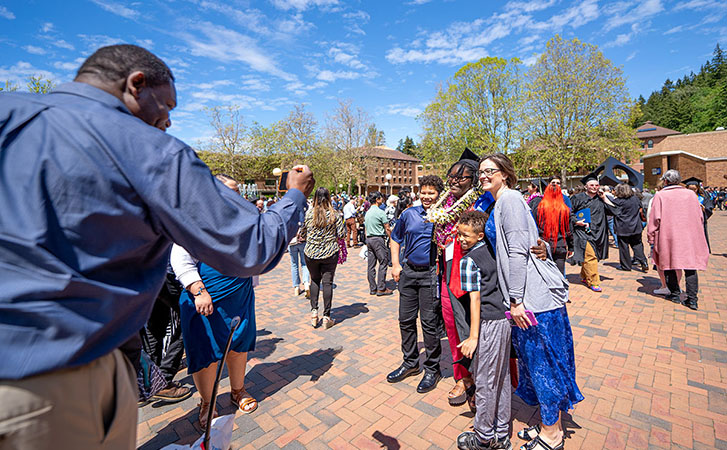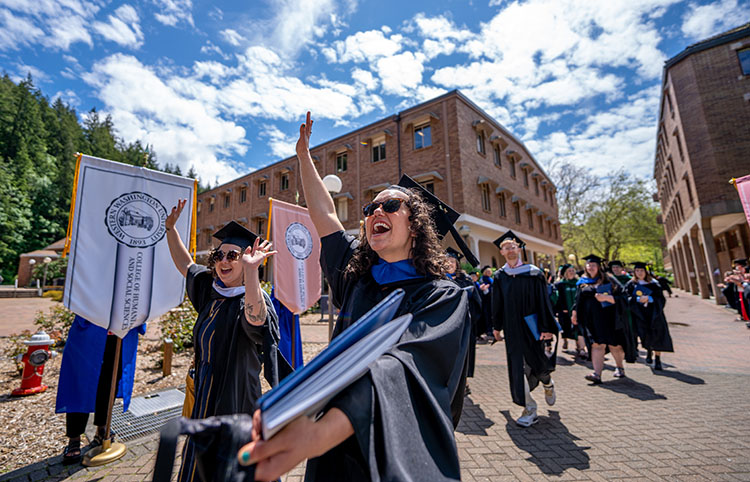Families

Supporting Your Student's Career Development
Your student's years at Western will be a time of dramatic growth and development. Your support and encouragement can be very meaningful to students as they decide on a career path. The following tips can help you support your student’s academic, social and career development while at Western.
Share your observations regarding your student's special talents and past successes. Provide support and feedback as new interests and goals develop. Encourage your student to use GUR (General University Requirement) courses to explore areas of interest. The Career Services Center offers Career assessments as a tool to help students identify interests and relate them to fields of study and potential career fields.
Most students have stereotypical views of careers. To help your student start thinking about different kinds of careers, talk about your job, the field you work in and your employer. Discuss different organizational cultures and encourage your student to explore occupations and work environments by doing informational interviews or job shadows with relatives, family friends and individuals in your professional network. Informational interviews are particularly helpful in developing networking skills that will be valuable in seeking internships or career employment. Remind your student that the Career Services Center has a wealth of resources to help them explore career options, many can be found on our major and career exploration page.
While it may be tempting to try to "nudge" your student into what you consider to be a practical or marketable degree, students are more successful when they follow their unique interests and passions. For most fields and professions, choosing a major is not equal to choosing a career. We encourage students to major in a subject that interests them because excitement generates engagement and investment, which can lead to more success overall. Although there are exceptions, in general, there are many paths that can lead to a particular job. Encourage your student to check out the Academic Advising & Student Achievement Center’s Choosing a Major page for support in choosing a major.
Instead of focusing on the major course of study as the sole determinant of a student’s employability, listen to what your student says they are interested in doing after graduation. How can they do this type of work through the knowledge gained in their academic major as well as through additional experiences and skills? Employers don't hire "majors"; they hire skills, experience and personal characteristics like a strong work ethic, initiative, and the ability to work effectively as a member of a team.
Hopefully, when ready to graduate, your student will have a resume that reflects more than their major field of study. Campus leadership activities, thoughtfully selected elective coursework, internship experience and volunteer work provide opportunities for students to develop marketable knowledge and skills.
Our employment survey data reveals that students with internship experience find jobs faster and earn higher starting salaries. Some employers hire exclusively from within their own internship programs to make their entry-level hires. In addition to providing an opportunity to develop and document skills employers are looking for, internships also allow students to "test-drive" areas of interest and build professional contacts. Encourage your student use our Internship Resources page as a starting point.
Job shadows and informational interviews at the career exploration stage (see above) can provide a head start with networking to seek internships or career employment. Professional networking allows students to develop relationships through which they can identify, or in some cases create, the kinds of opportunities they want. Provide your student with names and contact information for people in your personal and professional networks who might be able to assist them. Encourage them to use LinkedIn and connect with their Western network and check out our Build your Network webpage.
Every year graduating students tell us they wish they had connected with us earlier and that they didn't realize we had so many resources available to help them. We serve current students and alumni for life, navigate to the undergraduate students or alumni pages on our website for more information on the services we provide to students.
If you're able to influence your organization's hiring activities, encourage your colleagues to recruit at Western by listing openings on our website, recruiting on campus and participate in our career fairs. For more information, visit our Join the Employer Partners Program page.
NSSFO Parent & Family Page
Parents and family members are important partners in supporting student success at Western Washington University. New Student Services/Family Outreach (NSSFO) provides outreach and services to help strengthen students and families' connection to Western, including:
Dollar & Sense of a College Degree
At the Career Services Center, we recognize that financial considerations are a crucial component of your student's educational investment, and their chosen career path plays a pivotal role in this equation. To support you in this journey, we've curated a selection of resources designed to assist you in navigating the financial aspects of your student's educational journey and career planning.

- Our annual Graduate Outcomes Report provides extensive information on the employment and starting salaries of WWU graduates.
- Use this Salary Calculator from NACE (National Association of Colleges & Employers)
- Explore PayScale for information on average salaries. You can search by occupation, type of employer, years of experience and geographic location.
- Find on-campus and off-campus part-time employment opportunities through the Student Employment Center
- Search hundreds of Internship opportunities on Handshake (WWU’s free recruitment platform)
- Search available Scholarships through WWU’s Scholarship Center
- You can use this College Budget Excel Template and Step-by-Step Tutorial to help your student budget while they're at Western and to help them determine their salary requirements after they graduate.
- Learn how to support your student in being financially responsible
Job Market Information
The Career Services Center has generated a list of useful resources to assist individuals in understanding labor market trends at the regional, state and national levels. Exploring these resources will help students to better understand the climate of the current labor market and make informed career decisions as they prepare to enter the world of work.

Data about the U.S. economy and labor market, collected and disseminated by this division of the Department of Labor.
Great source of Washington State labor market information.
Find out where WWU graduates are going post-graduation. Includes data on employment (location, employer name, industry and wages) and graduate school enrollment.
Learn about trends and predictions in college recruiting
Features local business news about Seattle. A great resource for up-to-date industry-specific information and professional networking events!
Graduate Outcomes Report
Find out where WWU graduates are going post-graduation. Includes data on employment (location, employer name, industry and wages) and graduate school enrollment.
